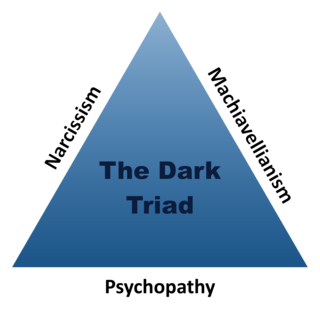 W
WPsychological manipulation is a type of social influence that aims to change the behavior or perception of others through indirect, deceptive, or underhanded tactics. By advancing the interests of the manipulator, often at another's expense, such methods could be considered exploitative and devious.
 W
WDivide and rule, or divide and conquer, in politics and sociology is gaining and maintaining power by breaking up larger concentrations of power into pieces that individually have less power than the one implementing the strategy.
 W
WA false dilemma, also referred to as false dichotomy, is an informal fallacy based on a premise that erroneously limits what options are available. The source of the fallacy lies not in an invalid form of inference but in a false premise. This premise has the form of a disjunctive claim: it asserts that one among a number of alternatives must be true. This disjunction is problematic because it oversimplifies the choice by excluding viable alternatives. For example, a false dilemma is committed when it is claimed that, "Stacey spoke out against capitalism; therefore, she must be a communist". One of the options excluded is that Stacey may be neither communist nor capitalist. False dilemmas often have the form of treating two contraries, which may both be false, as contradictories, of which one is necessarily true. Various inferential schemes are associated with false dilemmas, for example, the constructive dilemma, the destructive dilemma or the disjunctive syllogism. False dilemmas are usually discussed in terms of deductive arguments. But they can also occur as defeasible arguments. Our liability to commit false dilemmas may be due to the tendency to simplify reality by ordering it through either-or-statements, which is to some extent already built into our language. This may also be connected to the tendency to insist on clear distinction while denying the vagueness of many common expressions.
 W
WFlattery is the act of giving excessive compliments, generally for the purpose of ingratiating oneself with the subject. It is also used in pick-up lines when attempting to initiate sexual or romantic courtship.
 W
WA frown is a facial expression in which the eyebrows are brought together, and the forehead is wrinkled, usually indicating displeasure, sadness or worry, or less often confusion or concentration. The appearance of a frown varies by culture. Although most technical definitions define it as a wrinkling of the brow, in North America it is primarily thought of as an expression of the mouth. In those cases when used iconically, as with an emoticon, it is entirely presented by the curve of the lips forming a down-open curve. The mouth expression is also commonly referred to in the colloquial English phrase "turn that frown upside down" which indicates changing from sad to happy.
 W
WA gift or a present is an item given to someone without the expectation of payment or anything in return. An item is not a gift if that item is already owned by the one to whom it is given. Although gift-giving might involve an expectation of reciprocity, a gift is meant to be free. In many countries, the act of mutually exchanging money, goods, etc. may sustain social relations and contribute to social cohesion. Economists have elaborated the economics of gift-giving into the notion of a gift economy. By extension the term gift can refer to any item or act of service that makes the other happier or less sad, especially as a favor, including forgiveness and kindness. Gifts are also first and foremost presented on occasions such as birthdays and holidays.
 W
WGullibility is a failure of social intelligence in which a person is easily tricked or manipulated into an ill-advised course of action. It is closely related to credulity, which is the tendency to believe unlikely propositions that are unsupported by evidence.
 W
WAttention is the behavioral and cognitive process of selectively concentrating on a discrete aspect of information, whether considered subjective or objective, while ignoring other perceivable information. William James (1890) wrote that "Attention is the taking possession by the mind, in clear and vivid form, of one out of what seem several simultaneously possible objects or trains of thought. Focalization, concentration, of consciousness are of its essence." Attention has also been described as the allocation of limited cognitive processing resources. Attention is manifested by an attentional bottleneck, in term of the amount of data the brain can process each second; for example, in human vision, only less than 1% of the visual input data can enter the bottleneck, leading to inattentional blindness.
 W
WIn the field of personality psychology, Machiavellianism is a personality trait centered on manipulativeness, callousness, and indifference to morality. Though unrelated to the historical figure or his works, the trait is named after the political philosophy of Niccolò Machiavelli, as psychologists Richard Christie and Florence Geis used edited and truncated statements inspired by his works to study variations in human behaviors. Their Mach IV test, a 20-question, Likert-scale personality survey, became the standard self-assessment tool and scale of the Machiavellianism construct. Those who score high on the scale are more likely to have a high level of deceitfulness and an unempathetic temperament.
 W
WMind Games is an American comedy-drama television series created by Kyle Killen that aired on ABC. The show is about two brothers who run a problem solving firm called Edwards and Associates that employs solutions based on psychological manipulation. It premiered on February 25, 2014, and was canceled on March 27, 2014.
 W
WPropaganda is communication that is primarily used to influence an audience and further an agenda, which may not be objective and may be selectively presenting facts to encourage a particular synthesis or perception, or using loaded language to produce an emotional rather than a rational response to the information that is being presented. Propaganda is often associated with material which is prepared by governments, but activist groups, companies, religious organizations, the media, and individuals also produce propaganda.
 W
WIn behavioral psychology, reinforcement is a consequence applied that will strengthen an organism's future behavior whenever that behavior is preceded by a specific antecedent stimulus. This strengthening effect may be measured as a higher frequency of behavior, longer duration, greater magnitude, or shorter latency. There are two types of reinforcement, known as positive reinforcement and negative reinforcement; positive is whereby a reward is offered on expression of the wanted behaviour and negative is taking away an undesirable element in the persons environment whenever the desired behaviour is achieved. Rewarding stimuli, which are associated with "wanting" and "liking" and appetitive behavior, function as positive reinforcers; the converse statement is also true: positive reinforcers provide a desirable stimulus. Reinforcement does not require an individual to consciously perceive an effect elicited by the stimulus. Thus, reinforcement occurs only if there is an observable strengthening in behavior. However, there is also negative reinforcement, which is characterized by taking away an undesirable stimulus. Changing someone's job might serve as a negative reinforcer to someone who suffers from back problems, i.e. Changing from a labourers job to an office position for instance.
 W
WThe reward system is a group of neural structures responsible for incentive salience, associative learning, and positively-valenced emotions, particularly ones involving pleasure as a core component. Reward is the attractive and motivational property of a stimulus that induces appetitive behavior, also known as approach behavior, and consummatory behavior. A rewarding stimulus has been described as "any stimulus, object, event, activity, or situation that has the potential to make us approach and consume it is by definition a reward". In operant conditioning, rewarding stimuli function as positive reinforcers; however, the converse statement also holds true: positive reinforcers are rewarding.
 W
WGeorge K. Simon is the American self-help author of In Sheep's Clothing: Understanding and Dealing with Manipulative People, a 1996 book about psychological manipulation.
 W
WA smile is formed primarily by flexing the muscles at the sides of the mouth. Some smiles include a contraction of the muscles at the corner of the eyes, an action known as a Duchenne smile. Among humans, a smile expresses delight, sociability, happiness, joy or amusement. It is distinct from a similar but usually involuntary expression of anxiety known as a grimace. Although cross-cultural studies have shown that smiling is a means of communication throughout the world, there are large differences among different cultures, religions and societies, with some using smiles to convey confusion or embarrassment.
 W
WA threat is a communicated intent to inflict harm or loss on another person. Intimidation is widely observed in animal behavior chiefly in order to avoid the unnecessary physical violence that can lead to physical damage or the death of both conflicting parties. A threat is considered an act of coercion.
 W
WA scream is a loud vocalization in which air is passed through the vocal folds with greater force than is used in regular or close-distance vocalisation. This can be performed by any creature possessing lungs, including humans.